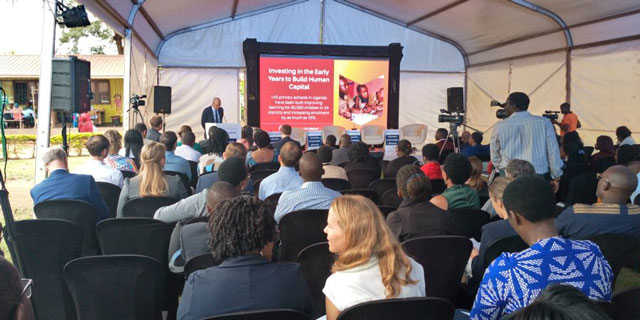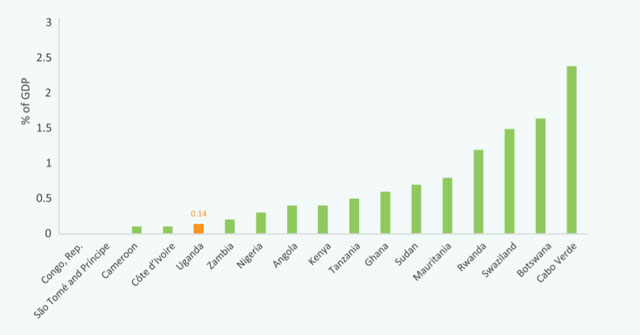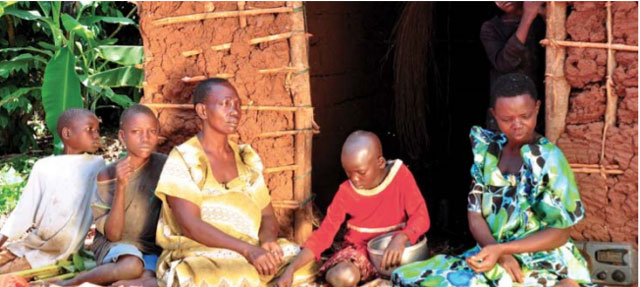
Kampala, Uganda | THE INDEPENDENT | The World Bank has today released the 14th Uganda Economic Update which has focused on social protection systems in Uganda and proposes a more effective approach to reduce vulnerability and to support more inclusive growth.
The report indicates that the coverage and design of social protection programs
are currently insufficient to meaningfully address the range and scope of vulnerabilities to shocks in Uganda. (SEE FULL REPORT BOTTOM)
It indicates that the existing direct income support programs in Uganda have low coverage, with the overall reach of the two main programs at only 3% of the population – which is very low given the needs in the country. Direct income support reaches more than 6 percent of the population in neighboring Kenya.
The report was officially launched at Kiswa Health Centre in Kampala. Kiswa centre is a Kampala City Council Authority (KCCA) facility that provides free healthcare to 250 outpatients every day, mostly from very low income families living around Bugolobi, Nakawa, Kinawataka, Mbuya, Kitintale – underlining the importance of social protection.
Secretary to the Treasury Keith Muhakanizi attended the launch and thanked the World Bank for sharing research that’s needed in making key economic and development decisions. He stressed that research is key to any country’s development.
He said it was time the political class start thinking about social protection as much they do physical infrastructure.
Uganda’s support programmes
Direct income support in Uganda is currently composed of two major and several minor programs that have limited financing. They are the Senior Citizens Grant (SCG) and cash grants given through the Northern Uganda Social Action Fund 3 (NUSAF 3).
According to the report, spending on the two major programs amounted to about 0.14 percent of GDP in FY17/18, which is lower than neighboring countries like Kenya and Rwanda who spend 0.4 percent and 0.3 percent of GDP, respectively, on direct income support.

A large part of spending on SCG and NUSAF 3 is also provided by donor grants or concessional loans, which raises concerns about the medium to long-term sustainability of financing to the sector
In line with the structure of earlier editions of the Uganda Economic Update series, the report reviews recent economic developments, provides an outlook for the macro-economy, and then delves into the special topic of social protection.
It comes at a critical time to inform both budget decisions over the next few years, and the on-going development of Uganda’s Third National Development Plan.
The report notes that although Uganda experienced strong economic growth in the 1990s and 2000s, more recently there has been a slowdown. This has been particularly pronounced in per capita terms, due to the persistently high fertility rates still observed and increasingly low levels of productivity.
As a result, the report stated, one in five Ugandans still live in extreme poverty and more than a third live on less than US$1.90 a day (in 2011 PPP dollars). Beyond poverty, the report stated, many households in Uganda remain vulnerable.
“These households are susceptible to income fluctuations, food insecurity, and often do not have the means to cope with shocks that they may experience. The most common shocks include droughts, irregular rains, serious illnesses, or accidents to the main income earners.”
“Social protection programs are important policy tools for building resilience, mitigating risks and supporting households to invest in human capital. When individuals are vulnerable, it is difficult for them to make longer term investments to improve their own livelihoods or educate their children.”

receive the grant.
Recommendations
Social protection, the report states, has become a core part of any country’s development strategy to address poverty and protect households exposed to increasing shocks from disasters such as droughts, floods, international price shocks, and conflict.
An important recommendation of the report is to prioritize any social protection expansion to areas with the highest levels of vulnerability and risk.
Throughout sub-Saharan Africa, cash transfers, public works programs, and other in-kind and cash interventions and services continue to change the lives of millions of vulnerable people. When times get tough, such programs protect households, helping them to avoid selling critical assets or taking children out of school in order to survive.
In order to strengthen social protection to reduce vulnerability and promote inclusive growth, the key recommendations are that Direct Income Support be expanded to support investments in human capital and to help mitigate shocks ; Existing disaster risk financing pilots are scaled up to better prepare for drought and mitigate other shocks; Given the limited fiscal space, social protection expansion is focused on the poor and vulnerable in the neediest geographical areas; Agricultural insurance is scaled up given that drought risks predominate, and households engaged in agriculture are most affected by such risks ; Fiscal incentives are provided to improve the takeup of voluntary savings schemes by informal sector workers.
The report notes that for Uganda to benefit from its demographic dividend, it is critical to invest in the human capital of the current cohort of both infants, to reduce stunting, and children, to improve education and skills outcomes. This would mean prioritizing the sub-regions of Acholi, Bunyoro, Busoga, Elgon, Karamoja, Lango, Teso, Tooro and West Nile for the geographic expansion of social protection.
The report recognises the impact so far of the third Northern Uganda Social Action Fund, the Senior Citizens Grant and other social care and services interventions continue to enable poor and vulnerable people, across the different stages of their lives, to increase their household incomes, access better services for themselves and their families, and to protect themselves against unforeseen shocks.
Elsewhere, in 2019 the Kampala Capital City Authority launched Uganda’s first urban social protection program for adolescent girls, targeting girls who are
both in and out of school.
Uganda Economic Update 14th Edition by The Independent Magazine on Scribd
 The Independent Uganda: You get the Truth we Pay the Price
The Independent Uganda: You get the Truth we Pay the Price


